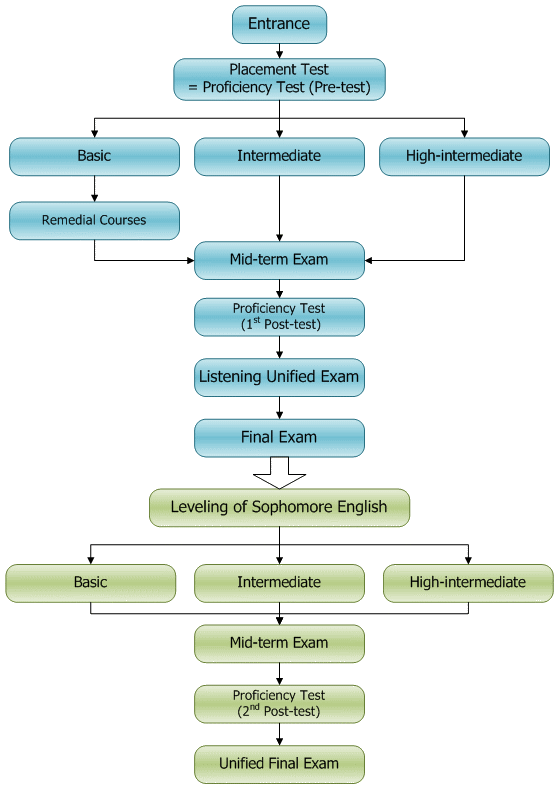|
The Importance of Freshman English
There are two areas that freshmen need to improve in learning English: Basic
Interpersonal Communication Skills, along with basic reading and
writing skills, and Academic English Ability in professional
fields. In fact, the improvement in Basic Interpersonal Communication Skills
will provide the foundation for higher proficiency in Academic English Ability.
In both undergraduate and graduate programs, many courses will be instructed
via English handouts and/or English textbooks. Therefore, a sound foundation
built from freshman English courses will enable students to be successful in
applying for short-term overseas programs, pursuing graduate degrees in foreign
universities, or immigrating to other countries in the future. It will also
enhance students' academic competence and in turn their qualification for the
future job market.
In addition to the practical implication, English itself is an interesting
subject. With proficient English, students' worldviews will be broadened and
their lives will become more fruitful and colorful.
Ideals and Goals of Freshman English
The ideal of freshman English is not only to improve both Basic
Interpersonal Communication Skills and Academic English
Ability but also to enhance students' humanity disposition.
Therefore, students are expected to become fully-functioning persons.
With the idea of student-centered teaching in mind, lecturers will offer
meaningful course contents and materials based on students' backgrounds and
interests; the objective is to shape the students' independent learning
capabilities. The specific goals of those learning capabilities include the
following areas.
Listening: To be able to understand daily conversational
English and to respond properly
Speaking: To be able to communicate with teachers, classmates,
and friends in English in a natural and meaningful fashion
Reading: To be able to apply various reading skills in
understanding the content of general articles
Writing: To be able to clearly express opinions with various
phrases, paragraphs, and articles
Placement test and Differentiating Teaching
Differentiating teaching commenced at the semester of Fall 2006. Based on the
results of the placement test during enrollment, students will be divided into
one of the three levels - Basic, Intermediate, and High-intermediate.
Under this policy, teaching difficulties resulting from the potential huge gaps
among students' competence can be avoided. Students should try their best in
the placement test to avoid improper categorization of their actual English
proficiency. Otherwise, courses can be either too easy or too difficult and
students' learning outcome may then be compromised.
1. The Schedule of English Placement Tests
- Pre-test - in the freshman orientation
- Post-test - at the end of the second semester
2. Course Categorization - three Levels
- Basic
- Intermediate
- High-intermediate
3. Materials - designated course materials for students of the same level
 |
 For Students of Entrance Year 2006 For Students of Entrance Year 2006
 For Students of Entrance Year 2007 For Students of Entrance Year 2007
|
Testing and Evaluation
 The listening joint exam, taken by all freshmen by the end of the semester, counts for 15% of the semester grade. The listening joint exam, taken by all freshmen by the end of the semester, counts for 15% of the semester grade.
 Other quizzes and exams will be given by the individual lecturer of the class. Other quizzes and exams will be given by the individual lecturer of the class.
|
|
Adjustment of Student Placement
After the first semester, the adjustment of placement may be applied if found unsuitable. In this case, only one level of upgrading /downgrading each time is
allowed – from Basic to Intermediate or from Intermediate to High-intermediate, and vice versa.
|
|
Conditions for Upgrading:
 Semester grade over 85 Semester grade over 85
 Qualified attendance judged by lecturers Qualified attendance judged by lecturers
 Overall evaluation from lectures Overall evaluation from lectures
|
|
Conditions for Downgrading:
 Semester grade below 55 Semester grade below 55
 Qualified attendance judged by lecturers Qualified attendance judged by lecturers
 Overall evaluation from lecturers Overall evaluation from lecturers
|
|
Procedures for Application:
 Filling in the application form with the lecturer's signature Filling in the application form with the lecturer's signature
 Offering the copy of the semester transcript Offering the copy of the semester transcript
 Applying with forms before the add-and-drop period Applying with forms before the add-and-drop period
|
|
Pathway of Freshman English

|
 For Students of Entrance Year 2008 For Students of Entrance Year 2008
 For Students of Entrance Year 2009 For Students of Entrance Year 2009
 For Students of Entrance Year 2010 For Students of Entrance Year 2010
|
 |
English Requirements for Graduation
For students of the entrance year in/after 2008 in Four-year program of Daytime Department, it is required to pass one of
the tests with the right criterion, made by individual departments, by the end of the third school year. For details, please visit the website of Foreign Language Center.
English Credits Waiving
For non-English major students, in Four-year program of Daytime Department or Evening Department, who are holding
certain English certificates are eligible for credit waiving in required English courses. For details, please visit the website of Foreign Language Center.
|